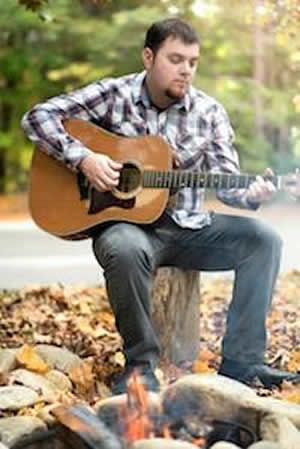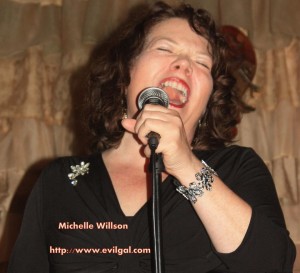 Michelle Willson has been a very busy gal lately. She’s currently learning songs to sing with Dr. John on a February 25th Wilbur Theater concert. Willson’s job is to be the female duet partner for the doctor’s tour to promote his latest release, a collection of Louis Jordan songs, some recorded with female singers.
Michelle Willson has been a very busy gal lately. She’s currently learning songs to sing with Dr. John on a February 25th Wilbur Theater concert. Willson’s job is to be the female duet partner for the doctor’s tour to promote his latest release, a collection of Louis Jordan songs, some recorded with female singers.
“They hire a female singer in whatever town they’re in and in this particular town that happened to be me,” she said, “and I’m like so excited I can’t even believe it.” Willson got the gig when Rhode Island musician and Berklee professor Dan Moretti, who is working on the show, passed her name on to Dr. John’s trombone player and arranger Sarah Morrow.
Coincidently, Willson is the only artist to record a released version of a song called “Responsibility” that was written by Dr. John and Doc Pomus. The opportunity to record it came to Willson through music industry channels after Irma Thomas nixed it for her own record, believing it would not be right for her.
“There was something about it that I really loved,” Willson began. “It’s funny. Even way back then I didn’t know why, but it was the mixed message of the song that I really liked. All these years later, I still do the tune. I’ve grown into the sentiment of it. Now, I understand the song in a way I didn’t before. I always think that’s the mark of a great song, that you can re-understand it.”
So, when Wilson got the call to perform with Dr. John she sent an MP3 of her version to Marrow. “At the time, I really didn’t understand the significance of it but later on, I was like, ‘What? Me?’”
Willson will be cramming her every free moment with practice for this show. Yet, that is only one of the coals she has in the fire right now. Willson, a one time W.C. Handy Award nominee, also regained her radio DJ job at WICN, playing her favorite songs on this National Public Radio station. Aside from that, Willson is still basking in the fine reception she’s received since she reentered the music scene a few years ago. Just over a year ago, Willson released the live album called Fortune Cookie which has garnered her some favorable reviews.
She had left the music scene a few years back after being overwhelmed by personal matters involving her parents’ health. Willson was also under a lot of pressure from becoming successful, touring the world and getting world wide radio play.
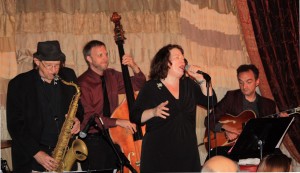 “I’m really grateful for everything that happened to me because I’ve made it back up out of the woods,” she said. “At the time, though, I just started to crash and burn. I turned to the usual things that people turn to when they’re feeling overwhelmed and stressed out.”
“I’m really grateful for everything that happened to me because I’ve made it back up out of the woods,” she said. “At the time, though, I just started to crash and burn. I turned to the usual things that people turn to when they’re feeling overwhelmed and stressed out.”
Willson, starting over from the bottom again, understood she had to take whatever gigs she could get. Now, three to fours years later, she’s playing out fairly often, hitting the Strange Brew Tavern in Manchester, New Hampshire, Chianti’s Lounge in Beverly Massachusetts, and Chan’s Egg Roll And Jazz in Woonsocket, Rhode Island. In fact, Willson recently landed a scheduled gig at The Cutting Room in New York City on March 19th, a Thursday night show.
“I worked really hard to get that gig,” she said. “I‘m really happy to be able to work in New York City again. It‘s been over a decade since I‘ve been down there.”
Willson is no stranger to hard work. She had to put a lot of effort into her recent live album release Fortune Cookie. She initially was putting together a Dinah Washington tribute show. Willson couldn’t get the theatrical staging she wanted and had to settle for a musical performance only. After performing the Washington tribute at Chan’s and at The Beehive in Boston, Willson realized she just wanted to make a recording of songs she likes, rather than record a tribute album to just one artist.
“It was not a whole lot of planning,” she said. “It was just an idea I had. I didn’t know how I was going to make it happen because I’m still super poor. I refuse to give in and I’m too stubborn and pig headed to hold down a regular day job. I’m lucky to live with my sister, and that’s what gave me the head space to start putting things back together again.”
For a high profile gig, Willson landed a date at Sculler’s Jazz Club in Cambridge. When she told Sculler’s talent buyer Fred Taylor she wanted to make a live record, he suggested Sculler’s for its acoustics and its good sound man, Chris Gorwin.
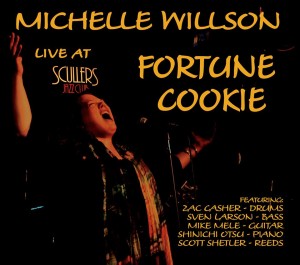 “Scullers, that night, was a little restrained,” Willson said. “It didn’t have the really exuberant and wild energy that a live recording really needs to have to really be successful. I also heard from somebody high up on the food chain that as a general rule, radio people and reviewers don’t like live albums because it’s just going to be a rehash of what people have already released. In this particular instance that’s not true. I selected material that I never recorded. But they don’t know that.”
“Scullers, that night, was a little restrained,” Willson said. “It didn’t have the really exuberant and wild energy that a live recording really needs to have to really be successful. I also heard from somebody high up on the food chain that as a general rule, radio people and reviewers don’t like live albums because it’s just going to be a rehash of what people have already released. In this particular instance that’s not true. I selected material that I never recorded. But they don’t know that.”
Willson feels that the CD’s saving grace is that it documents what she sounds like live at this point in her career. The critically acclaimed albums she made for Rounder ten years ago don’t prove she can still deliver the goods. “It was an accurate representation of my deal now,” she said. “I like to give some of the history of the material that I’m doing, especially when it’s not my material. That’s part of what excites me about this music, the history of it. The rich, incredibly complicated tapestry of this music.”
Willson is still working on the marketing for the album, finding reviewers, sending it out to the right people. She kept getting hung up on what she perceives as the CD’s imperfections, taking to heart some negative comments from industry people that it isn’t up to par.
A question that always comes up regarding Willson is exactly what kind of music does she play? Is it vocal jazz song material? Is it old blues material? She doesn’t know herself. “I like to bring jazzy influences to blues roots music and I like to bring blues roots influences to sophisticated jazz music,” she said. “It’s the meeting. It’s the exact crossroads where all that comes together. I don’t know what to call that. In the past, we’ve been the blues act at jazz festivals and we’re the jazz act at blues festival.”
Willson noted that musicians of the 1930s and the 1940s were incredibly, highly trained players who could play a society party in the evening before doing a Broadway show later where they were reading charts then going to uptown clubs to play blues.
“They could easily switch between genres,” Willson said, “ and so that is what I love, and what I look for in the musicians I want to work with. I want them to have heavy, heavy deep jazz chops, which is to say a large palette from which to draw, However, I want them to have enough sense not to use any of it. It just lies there under the surface informing every choice that they make, every chord that they play, every solo that they take. It informs it, but they’re not constantly showing off.”
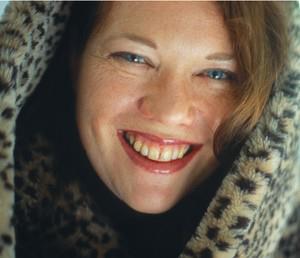 During Willson’s stint with Rounder/Bull Eye Records, her marketing people put that blues label on her so they could sell her records. Willson pointed out that no one knew how to categorize her. “She could get down and dirty, as dirty as the next person, and she was incredibly complicated, and she could sing jazz like nobody’s business, and they didn’t know how to market her. I believe that’s part of the reason why she never really got the kind of acclaim that she should have. Someone like Ella Fitzgerald, same thing. You listen to her sing blues, she can get down with the best of them, but she got that jazz tag hung on her, and then she was considered to be this ethereal jazz singer.”
During Willson’s stint with Rounder/Bull Eye Records, her marketing people put that blues label on her so they could sell her records. Willson pointed out that no one knew how to categorize her. “She could get down and dirty, as dirty as the next person, and she was incredibly complicated, and she could sing jazz like nobody’s business, and they didn’t know how to market her. I believe that’s part of the reason why she never really got the kind of acclaim that she should have. Someone like Ella Fitzgerald, same thing. You listen to her sing blues, she can get down with the best of them, but she got that jazz tag hung on her, and then she was considered to be this ethereal jazz singer.”
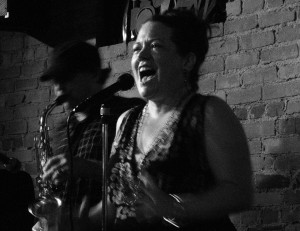 Willson said great musicians can play anything, and that the labels are for the convenience of the people trying to sell the music, not the listener or the musician. “But, what are you going to do,” she asked. “Marketing is part of the business. It’s called the music business.”
Willson said great musicians can play anything, and that the labels are for the convenience of the people trying to sell the music, not the listener or the musician. “But, what are you going to do,” she asked. “Marketing is part of the business. It’s called the music business.”
Willson, back in her earlier days, won a Boston blues challenge before winning the International Blues Competition in Memphis. That resulted in a slot at King Biscuit Blues Festival in Helena, Arkansas and a record deal. She ended up on Rounder Bulls Eye which was co-owned by Marian Leighton Levy.
“I just loved the idea of being mentored by a woman,” Willson said. “And Ron Levy, they were married at the time, produced my records. I don’t know anything about the music business. I still don’t. I go by instinct. Every time I would be driving down the highway, late at night, listening to Mai Cramer’s program, whenever I heard a record come on that just made me want to bounce up and down in my seat, as I was driving, it was always produced by Ron Levy. I thought ’I don’t know what that guy’s doing, but that’s the guy I want producing my record.’”
Levy and Scott Billingsley were the two producer for the Bulls Eye Blues label. Willson learned a lot from the straight shooting Levy who advised her to start writing her own songs, telling her to speak in her voice and tell her own story. “So, I did,” she said.
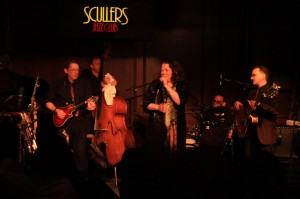 Willson has had, over the years, many people wondering how she sings with such a forceful voice. She uses an old school technique that won’t work with today’s modern techniques like Auto Tune. It takes a singer two decades to build up the muscles to support the voice fully, from the bottom to the top of the register. Many singers have a big sounding bottom voice and as they start to move up the register, there is a point at which it breaks, and then suddenly they will have a high voice, almost like two separate voices in the same person.
Willson has had, over the years, many people wondering how she sings with such a forceful voice. She uses an old school technique that won’t work with today’s modern techniques like Auto Tune. It takes a singer two decades to build up the muscles to support the voice fully, from the bottom to the top of the register. Many singers have a big sounding bottom voice and as they start to move up the register, there is a point at which it breaks, and then suddenly they will have a high voice, almost like two separate voices in the same person.
“I was taught that you need to blend those two voices together, and you want one voice from the bottom to the top,” she said. “Of course, it will switch over as you go up registers but you want basically an unbroken thread from the bottom of your range up to the top. You want to be able to navigate it like you were driving on a cliffy mountain road. You don’t stop, get out , and turn the car around. You just keep going.”
Willson’s early influences were The Beatles, Led Zeppelin, and Joan Baez. She later formed a funk band singing songs associated with Aretha Franklin and Chaka Kahn, but those never felt quite right. She eventually listened to some cassette tapes that people had been giving her over the years, and she finally listened to what her voice wanted to do.
Willson took the nickname Evil Gal from the song “Evil Gal Blues” by Dinah Washington, a female protagonist singing about being how she was “all that.” It was about a triumphant, bad mama who calls the shots. This appealed to Willson, who at the time, was a young woman, going through a divorce while dealing with music scene issues. “If it was good enough for Dinah Washington and Ruth Brown, it was good enough for me,” she said. “Subsequent to that time, though, I have become much more evil. I feel that I can wear the moniker proudly.”
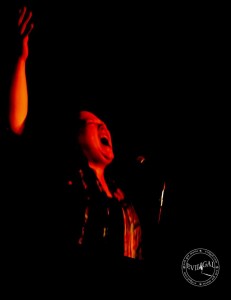 Since making her four critically acclaimed albums for Rounder/Bulls Eye, her style and approach have changed somewhat. She now wants to write more of her own material. In spite of herself, she learned to follow a chart. “I was very much attached to the arrangements,” she said. “I wanted an arrangement where I knew what was going to happen, nothing was going to take me by surprise.” Now, Willson uses a smaller combo so the arrangement isn’t as crucial to keeping the sound together. “I’ve started doing more gigs with just guitar, bass, and drums, which, interestingly enough, has to taken me back to my original Led Zeppelin roots.”
Since making her four critically acclaimed albums for Rounder/Bulls Eye, her style and approach have changed somewhat. She now wants to write more of her own material. In spite of herself, she learned to follow a chart. “I was very much attached to the arrangements,” she said. “I wanted an arrangement where I knew what was going to happen, nothing was going to take me by surprise.” Now, Willson uses a smaller combo so the arrangement isn’t as crucial to keeping the sound together. “I’ve started doing more gigs with just guitar, bass, and drums, which, interestingly enough, has to taken me back to my original Led Zeppelin roots.”
Formerly a world touring act, Willson will play Beaches Jazz Festival in July in Toronto, and she’s making overtures to European contacts. She’d like to get back into the festival circuit and into more listening rooms. “Places where the club owner is just trying to sell beer, I get it. I’m probably not the right choice, and I don’t blame them. And it’s hard to get into those other kinds of rooms, the listening rooms.”
For now, Willson plays The Strange Brew in Manchester, New Hampshire, Chicanti’s Lounge in Beverly, The Beehive, Sculler’s, and The Regatta Bar in Boston, and Chan’s in Woonsocket, Rhode Island. Willson expressed gratitude toward each owner.
“I would like to keep doing what I’m doing,” Willson said. “I would like to be able to make recordings and have them come out the way I want.” She also wants to learn how to be an arts administrator, believing all of her years using her limited resources in the most efficient way possible can work for her in the arts.
“I think that can actually translate back into that field, so I’m going to go back to school and get a decent enough job that I can support my music habit.”
https://www.facebook.com/pages/Michelle-Willson-music-page/107343426060189?fref=ts

